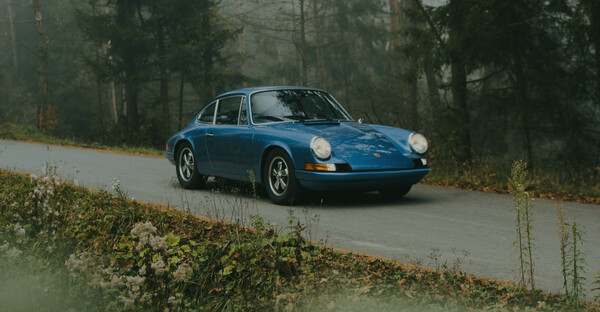Description
West Coast Classics are proud to present an absolutely stunning example of this increasingly collectible 1975 Ferrari Dino 308 GT4 2+2 V8 5spd Coupe in the beautiful and highly desirable color combination of original factory 'Rosso Corsa' (Racing Red) exterior paint with its all original Black leather seats with red piping interior with only some 60K original miles and 1 of only 2, 826 DINO 308GT 2+2 models built between 1974-79!
This 1975 Ferrari Dino 308 GT4 is powered by its matching #'s 2. 9-liter V8 producing 252hp, mated to the legendary 5-speed gated manual transmission. Finished in the classic 'Rosso Corsa' over Black with Red piping leather, this example is equipped with factory power windows, air conditioning, power brakes, power steering and a factory cassette player.
After 20 years of exclusive collaboration with Pininfarina, at the Paris Motor Show in 1973, Ferrari unveiled the Dino 308 GT4, a V8-engined 2+2 model designed by Pininfarina's local rivals, Bertone and to be marketed and sold as a 'Dino'. The Turin-based designer created an attractive model which was to be the marques first car with a mid-engine V-8 layout in a 2+2 body only some 4. 3 metres long, an outstanding achievement.
This was to be the first Ferrari with a Bertone-designed body with 255 horsepower 3. 0-litre V-8 engine, with gears shifted via the legendary gate shifted Ferrari five-speed manual transmission.
The sharp lines and wedge-like shape contrasted with the curves of the earlier Dino-badged 246 GT, providing Ferrari with an angular 2+2 coupe to face off against the Lamborghini Urracoone, Ferrari's main competitor of its day and incidentally, another mid-engine V-8 sports car designed by Bertone.
This first production Dino 308 GT4 was displayed by Ferrari at the 1973 Paris Motor Show and delivered to its first French owner later that year in the dazzling colour combination of Marrone Metallizzato over a Beige leather and cloth interior. The car sold at Pebble Beach in 2023 for $450, 500.
This was the first Ferrari to be designed by Bertone, it was also the first production Ferrari to use a V8 engine, a 2. 9-litre 90-degree V8 being transversely mounted behind the cabin producing some 250bhp (at 7, 700rpm) and 210lb ft (at 5, 000rpm), or with the 2. 0-litre V8 version, the imported 208 GT4 from 1975, in a response to stringent Italian tax laws, producing a little less at just over 170bhp.
Ferrari's engineers squeezed an extra pair of seats into a wheelbase only some 21cm longer than the Dino 246, quite the achievement when that Ferrari V8 is mounted between the wheels, along with very impressive headroom for such a body style with the roof stretching over the rear seats easily before sloping back down. The Bertone designers excelled even themselves here.
Weighing little more than a tonne, 0-62mph is reportedly only a touch under 7 seconds and the car boasts a 158mph top speed. The driving position impressively and effectively points you at the centre of its goldfish-bowl windscreen, with the GT4 proving to have excellent visibility and handling as a result a simply fascinating and bewitching car to drive, a real drivers car that needs to be driven to be fully appreciated.
The 308 GT4 is one of the few classic Ferrari models that can claim credit for still being somewhat affordable and certainly should prove to be a very smart investment. Not least because these models both look and feel as the closest one can get to driving a Seventies supercar and one that boasts the 2+2 back seats with comfortable headroom too.
The Dino 308 GT4 was introduced in 1973 and supplemented by the 208 GT4 in 1975. The cars were sold with DINO badging (continuing the Dino brand to differentiate non-V12 Ferrari) until May 1976, when they received Ferrari badging. The GT4 was replaced by the Mondial 8 in 1980 after a production run of 2, 826 308s and 840 208s.
From the cockpit the driver sees only the road, a simply extraordinary driving experience with only the most necessary of luxurious additions of air conditioning, power brakes, power windows and steering.
Enzo Ferrari himself took a major role in its design, even having a mock-up made where he could sit in the car to test different steering, pedals and cockpit seating positioning.
The 308 GT4 gained the "Prancing Horse" badge in May 1976, which replaced the Dino badges on the hood, wheels, rear panel and the steering wheel while retaining the Dino 308GT4 logo on the rear boot lid. This has caused some confusion over the years with many prospective owners reportedly hesitant to buy such an expensive automobile not badged "Ferrari", and being confused at the now very collectible and significance of the Dino name.
Dino was Enzo Ferrari's son who died in 1956, and his name was to honor his memory on the models it was placed.
In an effort to improve sales until the 1976 official re-badging, Ferrari sent out factory update on July 1, 1975 with technical and cosmetic revisions in many areas. Some of these revisions were implemented piecemeal by dealers. Some made all the revisions while some just made a few. This leaves many 1975 GT4's with a variety of modifications which are hard to document as "correct" to aficionados who may not understand the complicated series of events surrounding this model year. Some of the revisions included adding Prancing Horse badges, such as this particular model, repainting in the two-tone scheme (lower half painted matte black), air conditioning fixes, etc. It also included bumper modification and exhaust changes for North American versions.
The Dino 308 GT4 was the only Ferrari legally imported to the US in 1975, and it was also the year Niki Lauda won the Formula One drivers championship and Ferrari won the constructors title with the GT4 being the only 2+2 Ferrari ever raced with factory support.
There were two series of GT4; the earlier cars featured a twin distributor engine and foglamps mounted in the front valance. Later cars had a single distributor engine, with foglamps mounted behind the front grille.
Introduced at the Geneva motor Show in 1975 the 208 GT4 was a low-displacement version of the V8 produced for the Italian market, where cars with engines larger than two litres were subjected to more than double VAT (38%). The engine was de-bored to (66. 8 by 71 mm) 2. 0 L (1991 cc) V8, resulting in the smallest production V8 in history for a road car. Power output is 170 hp at 7700 rpm for a top speed of 220 km/ h (137 mph). Smaller Weber 34 DCNF carburetors, a lower final drive ratio and skinnier tires completed the technical changes for the 208. Chrome (rather than black) accents outside and the lack of fog lights were external visual indicators of the smaller-engined GT4. Inside the 208 GT4 featured a black rather than silver dash facing. The 208 GT replaced the 208 GT4 in 1980, after only 840 cars had been built.
This particular 1975 Ferrari Dino 308 GT4 2+2 should be considered an extraordinarily rare example with an all original interior and no signs of any body damage or accidents in maybe the most classic and striking of color combinations!
Although Ferrari badges crept onto the cars after 1975, unlike the Dino 246, this particular model remains one of the most affordable ways into real classic Ferrari Cavallino Rampante (or Prancing Horse) 5 spd gate shifter V8 ownership, and will surely prove to be an incredible investment for the astute classic car collector or indeed Ferrari enthusiast in the years to come, and already now an icon of its era and a car of many firsts.
















